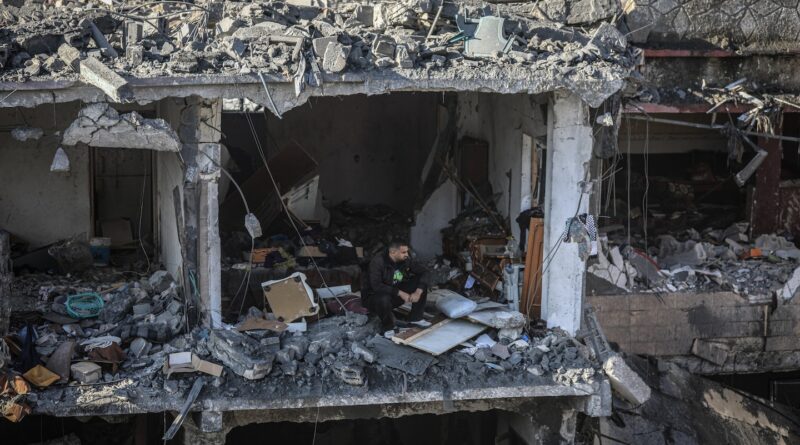Analysis | Israel is struggling to destroy Hamas, but it’s destroying Gaza
Prior to the outbreak of war, Herzog was widely seen as more dovish and reasonable in the eyes of the D.C. foreign policy establishment than Israel’s polarizing right-wing Prime Minister Benjamin Netanyahu. But since the attack, he and many other Israeli officials have taken a hard line, scoffing at global criticism of Israel’s bombardment of Gaza, while rejecting talk of a cease-fire to save Palestinian lives and alleviate a hideous humanitarian crisis.
Another vote over the matter is expected at the U.N. Security Council on Wednesday, with diplomats wrangling into the late hours Tuesday over a resolution that would not elicit a U.S. veto. A staunch backer of Israel, the Biden administration nevertheless appeared willing to signal its displeasure with the spiraling Palestinian death toll — now close to 20,000 people — at the world’s leading decision-making body, though, according to my colleague Karen DeYoung, it was pushing for wording calling for a “suspension of hostilities” rather than a cease-fire.
Separately, a potential one-week pause may be in the offing if Hamas follows through with a release of some three dozen hostages still held captive in Gaza. But Israeli officials are clear they are settling in for a long war. Herzog, adept at speaking to the Beltway set, said Israel would no longer tolerate Gaza being a “platform for Iran” — a reference to Hamas’s main foreign backers — “driving everyone into the abyss of bloodshed and warfare.”
Hamas is entrenched and difficult to defeat. Even after waging one of the most intense, heavy military campaigns in recent history, Israel has only neutralized a fraction of the militant group’s armed strength. And, in the process, it has ravaged the embattled territory where Hamas has held sway, displaced close to 90 percent of the population, flattened whole neighborhoods, triggered a sprawling humanitarian disaster and found itself flailing in a losing battle for global public opinion.
Gaza’s hospitals are in a state of collapse, with only a few capable of operating. Disease and hunger stalk the territory. Sanitation systems have failed. There’s little electricity, and almost no cooking gas. My colleagues talked to Palestinians who spend hours each day in desperate searches for food and water. “We have been humiliated by this war,” Khalil Tafesh, a father, said. “At the end of the day, we just want to live. Children just want to eat and drink. As a parent you will do everything you can to provide your kids food to eat.”
Concerns are only deepening about the smoldering status quo. Much of Gaza’s once-densely-populated north has been leveled, and the bulk of the territory’s population is crammed into makeshift accommodations near the southern Rafah border crossing with Egypt. The prospect of an exodus of refugees is becoming more real — a displacement that would be viewed by many in the region as yet another tragic moment of Palestinian dispossession, a trauma that would further roil the politics of the Middle East and likely undermine Israel’s rapprochement with some of its Arab neighbors.
“Whether that [refugee flow] happens as a result of a deliberate Israeli military strategy or by default … that may be a distinction without a difference,” a former senior Egyptian diplomat told my colleague Claire Parker.
All the while, Hamas, while bruised, has not been beaten. Israel is seeking to decapitate its military leadership and eliminate much of its military capacity. The ongoing campaign has proved difficult, no matter Israel’s far superior capabilities and resources. And even a near-total battlefield victory would not extinguish the group, which has roots in Palestinian society and positions itself as the standard-bearer of resistance to decades of Israeli occupation and land grabs.
“I would call it a very flexible entity which combines the characteristic ruling party, an underground organization and charitable fund,” Michael Milshtein of Tel Aviv University’s Moshe Dayan Center, told the Guardian. “It is not something where if you can kill the supreme commander the whole structure is undermined.”
But Israel, in the process, has crushed much more. “Rather than destroy Hamas, this war will destroy Gaza and render it largely uninhabitable, as we can already see in northern Gaza,” noted Dov Waxman, professor of Israel Studies at the University of California at Los Angeles. “This will fuel more militancy among Palestinians and more support for armed resistance.”
That sense of a bloody cycle is underscored by the chilling language coming from many prominent voices in the Israeli political establishment, including Netanyahu, who has discussed “thinning” out Gaza’s population. His rhetoric, observed Middle East historian Jean-Pierre Filiu, demonstrates that behind Israel’s “stated desire for retaliation lies the desire to eliminate not just Hamas but the Gaza Strip.”
Some Israeli politicians say this bluntly. “The whole Gaza Strip needs to be empty. Flattened. Just like in Auschwitz. Let it be a museum for all the world to see what Israel can do,” recently declared David Azoulai, mayor of Metula, Israel’s northernmost town. “Let no one reside in the Gaza Strip for all the world to see, because October 7 was in a way a second Holocaust.”
The official museum at the Holocaust’s most infamous concentration camp responded on social media, saying the Israeli mayor’s remarks “may sound as a call for murder of the scale akin to Auschwitz.”




